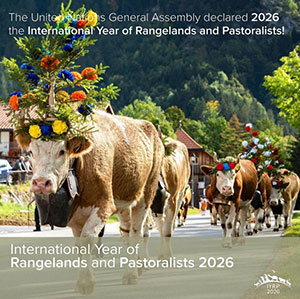This item has been supplied by a forage marketer and has not been edited, verified or endorsed by Hay & Forage Grower.

On 15 March 2022, the United Nations General Assembly (UNGA) in New York unanimously declared 2026 the International Year of Rangelands & Pastoralists (IYRP). This final approval is the culmination of an IYRP movement that grew over several years to become a global coalition of over 300 pastoralist and supporting organisations, including the International Livestock Research Institute (ILRI) and several UN agencies. Building on these efforts, the Government of Mongolia and 68 co-sponsoring countries developed and put forward the resolution to UNGA.
UNGA fully appreciates the importance of the IYRP resolution for addressing global biodiversity, climate change and socio-economic issues. It recognises that “pastoralism is a dynamic and transformative livelihood linked to the diverse ecosystems, cultures, identities, traditional knowledge and historical experience of coexisting with nature”. It affirms that “healthy rangelands are vital for contributing to economic growth, resilient livelihoods and the sustainable development of pastoralism.” It asks FAO to facilitate the implementation of the IYRP in 2026.
The rangelands cover over half [scientists currently estimate 54%] of the world’s earth surface and is thus our largest ecosystem, but is most endangered and least protected. Around the world, rangelands support the livelihoods and food security of hundreds of millions of pastoralists, who provide livestock products not only for themselves but also for millions of others. Pastoralists use their livestock to convert often sparse and short-lived vegetation that cannot be consumed by humans into inexpensive, healthy food with high-quality protein for both domestic and export markets. They thus contribute to global nutrition and food security.
Sustainable rangelands and pastoralism are sorely needed even more so now in a world facing an unpredictable and changing climate, where already over 700 million people – almost one-tenth of the world population – are suffering hunger, and where one million animal and plant species are threatened with extinction.
Particularly in the last 100 years, pastoralists have endured numerous injustices such as dispossession of their traditional grazing areas and blocking of their migration routes. Yet these communities continue to survive and apply knowledge and skills that make them strong allies in sustainable development in the face of the increasing uncertainty we are all experiencing. As stewards of the rangelands, they play a vital role in maintaining and increasing biodiversity and providing ecosystem services, such as in carbon sequestration and protection of watersheds.
Whereas industrial, confined, intensive livestock production has a big carbon and water footprint, the footprint of pastoral systems has been scientifically proven to be next to nil. Rangelands sustained by pastoralism form the largest carbon sink on the planet. Keeping rangelands managed under sustainable grazing practices is essential for climate change mitigation. Pastoralism is a production system that requires little fossil-fuel energy. It relies primarily on self-generating natural pastures. It also helps to prevent wildfires, since grazing consumes much of the ground- level vegetation that could provide the fuel to burn. Thus, pastoralism can be a nature-friendly livestock production system that optimises the dynamic balance between production and sustainability under highly variable and changing conditions.
The IYRP aims to raise awareness and fill knowledge gaps globally about the considerable benefits provided by healthy rangelands and sustainable pastoralism. It will also advocate for strengthening the capacity of the pastoral livestock sector and for increasing responsible investment in this sector. The ultimate goal is to make rangelands and pastoralists prominent in policy debates around everything from confronting climate crises to reducing poverty, managing threats to biodiversity, developing sustainable food systems and helping to achieve the Sustainable Development Goals. In these debates, the IYRP will help amplify the voices of pastoralists and scientists about the value of rangelands and pastoralism.

